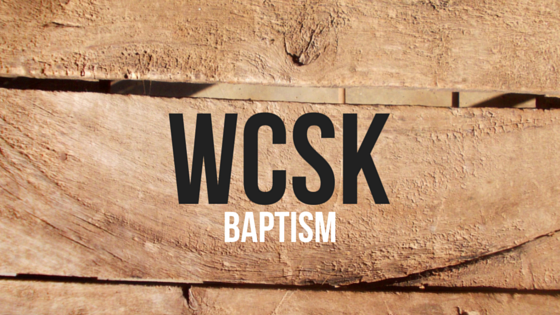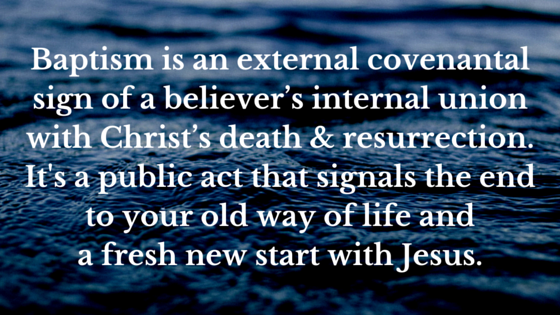Introduction
In the Great Commission, Jesus says the following:
“All authority has been given to Me in heaven and on earth. Go therefore and make disciples of all the nations, baptizing them in the name of the Father and the Son and the Holy Spirit, teaching them to observe all that I commanded you; and lo, I am with you always, even to the end of the age” (emphasis added; Matthew 28:18-20).
In other words, after Jesus rises from the dead and before He ascends into Heaven, He instructs His disciples (and by implication, all of us) to go out into the world to spread the Word of God. As a part of this commandment, Jesus also commands His disciples to baptize those in “all the nations” as well. This is a pretty inclusive and hefty command, so it is clear that baptism plays an important part in the Christian faith and the modern believer’s life. The question then becomes, what exactly is baptism, why is it so important, and what does it mean exactly? I will answer all of these basic questions in this lesson, but the reader should note that there is some debate in contemporary Christianity about the peculiarities of baptism. Here, I will start with the fundamental doctrine behind baptism and very briefly touch upon infant baptism at the end. My goal here is to make sure you understand the underlying principle, which Biblically is always more important than the resultant methods.
The Principle
What baptism is. The English word baptism derives from the Greek word baptizo, which means “to immerse, submerge, to make fully wet.” Baptizo is a derivative of the word bapto, which means to whelm or to cover wholly with fluid; of course, baptism is always performed in water.[1] In the Old Testament, washing in water was linked with religious and moral purity.[2]
Baptism is an outward sign of a believer’s inward union with Jesus Christ’s death, burial, and resurrection.[3]
Baptism is a symbol of a new covenant, and whenever God enters into a covenant with His people, He always substantiates His promises with a sign (e.g., a rainbow in the case of Noah and his family after the flood as a promise from God never to destroy the world by water ever again).
As with any other covenantal sign, it is a witness to something else that is not itself.
Accordingly, what circumcision was for the old covenant is what baptism is for the new.[4] Baptism as a formal practice actually began before the Great Commission with John the Baptizer.[5] [6] [7]
In Romans 6:3–4, the apostle Paul writes, “Or do you not know that all of us who have been baptized into Christ Jesus have been baptized into His death? Therefore we have been buried with Him through baptism into death, so that as Christ was raised from the dead through the glory of the Father, so we too might walk in newness of life.” In Colossians 2:12, Paul also writes, “having been buried with [Jesus] in baptism, in which you were also raised up with Him through faith in the working of God, who raised Him from the dead.” Hence, as Wayne Grudem writes, “Baptism thus very clearly pictures death to one’s old way of life and rising to a new kind of life in Christ.”[8]
Baptism, being an external and visible sign, points directly to an internal and invisible change. So we go down into the water, are “immersed or submerged” and then literally arise and symbolically arise like Christ, being made dirt free by the purifying water.
This cleansing figuratively washes us of our sins. The only exception to this is the baptism of Jesus, Who was sinless. His baptism was understood as Him being commissioned as the harbinger of God’s kingdom.[9] Titus 3:4–6 says:
“But when the kindness of God our Savior and His love for mankind appeared, He saved us, not on the basis of deeds which we have done in righteousness, but according to His mercy, by the washing of regeneration and renewing by the Holy Spirit, whom He poured out upon us richly through Jesus Christ our Savior” (emphasis added).
R. C. Sproul writes, “Baptism is a sign of God’s promise to regenerate His people, to liberate them from moral bondage of original sin, to cleanse their souls from guilt and purify them so that they can enter into a saving relationship with Him. So all of what happens in the Holy Spirit’s work of changing us from the inside out is signified by the sacrament of baptism. It is a sign of cleansing from sin, which is regeneration to new life in Christ.”[10]
Water baptism is also a sign of …
Dr. C. H. E. Sadaphal
[1] Mark 1:5, 10; Luke 4:16–22; John 3:23; Acts 8:36–39
[2] Isaiah 1:16–1; Jeremiah 4:14; Ezekiel 36:25
[3] Romans 8:29
[4] Colossians 2:9–15
[5] Luke 3:1–6
[6] It is worth mentioning that John’s baptism, technically speaking, was not equivalent to the baptism commanded by Christ. The former served as a rite of preparation and cleansing from sin for Jews, and therefore was grounded in the Old Testament, who awaited the arrival of the Messiah. New Testament baptism had much greater significance, was universal, and was commanded by Jesus, Who now had “All authority on heaven and earth” as a result of His finished work on the Cross. This new sign signifies everything God gives to us and thus represents a new covenant that was impossible before the resurrection in John’s time.
[7] There are also allusions to baptism in the Old Testament. For example, see II Kings 5.
[8] Wayne Grudem, Systematic Theology (Grand Rapids, MI: Zondervan, 1994), 969.
[9] Mark 1:10–11; c.f. Isaiah 42:1–9
[10] R. C. Sproul, What is Baptism? (Sanford, FL: Reformation Trust Publishing, 2012) Loc 254, Kindle.
[11] Acts 2:2–4, 16–17, 8:14–17, 10:44, 19:1–6; c.f. Joel 2:28–29
[12] I Corinthians 12:7
[13] John 3:3–5; Colossians 2:11–12
[14] Luke 23:43
[15] Ephesians 2:8–9
[16] Romans 6:23
[17] Galatians 1:16, 3:10, 5:4
[18] Romans 2:29
[19] Romans 9:6
[20] John 3:5; Titus 3:5; I Peter 3:21
[21] “He saved us, not on the basis of deeds which we have done in righteousness, but according to His mercy, by the washing of regeneration and renewing by the Holy Spirit.”
[22] Hebrews 2:5–18, 5:9
[23] Mark 16:16
[24] I Corinthians 12:13
[25] Hebrews 7:22, 8:6
[26] Romans 10:17
[27] For example Acts 16:33; I Corinthians 1:16.


